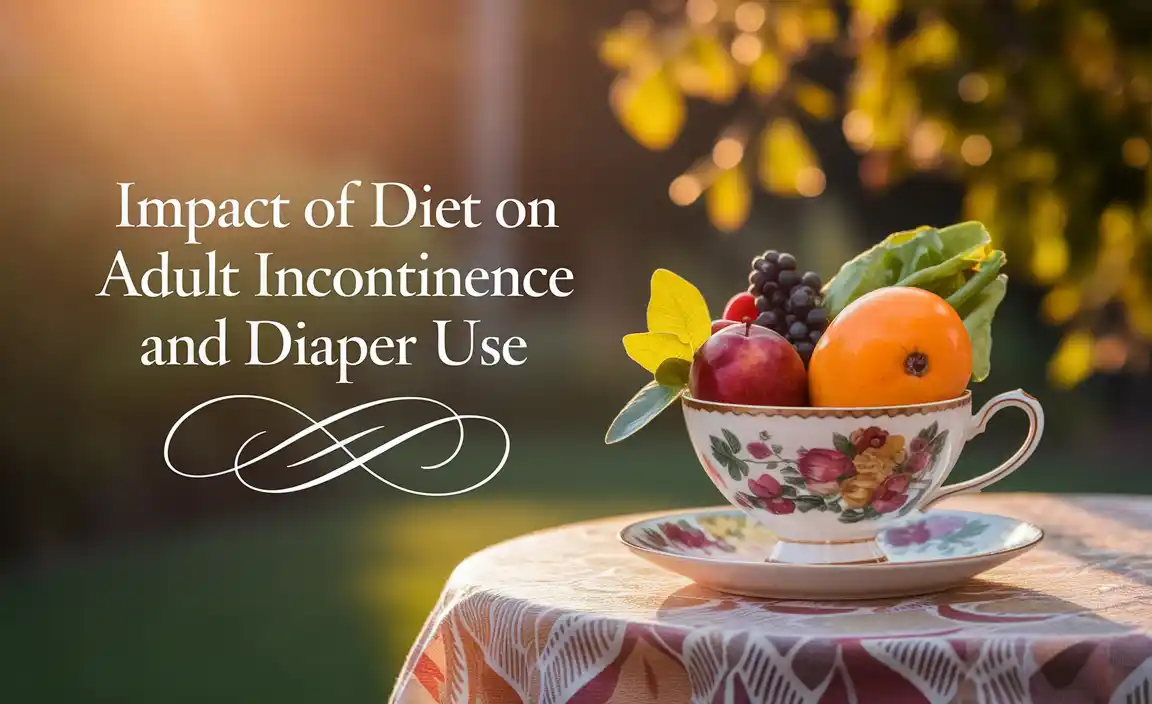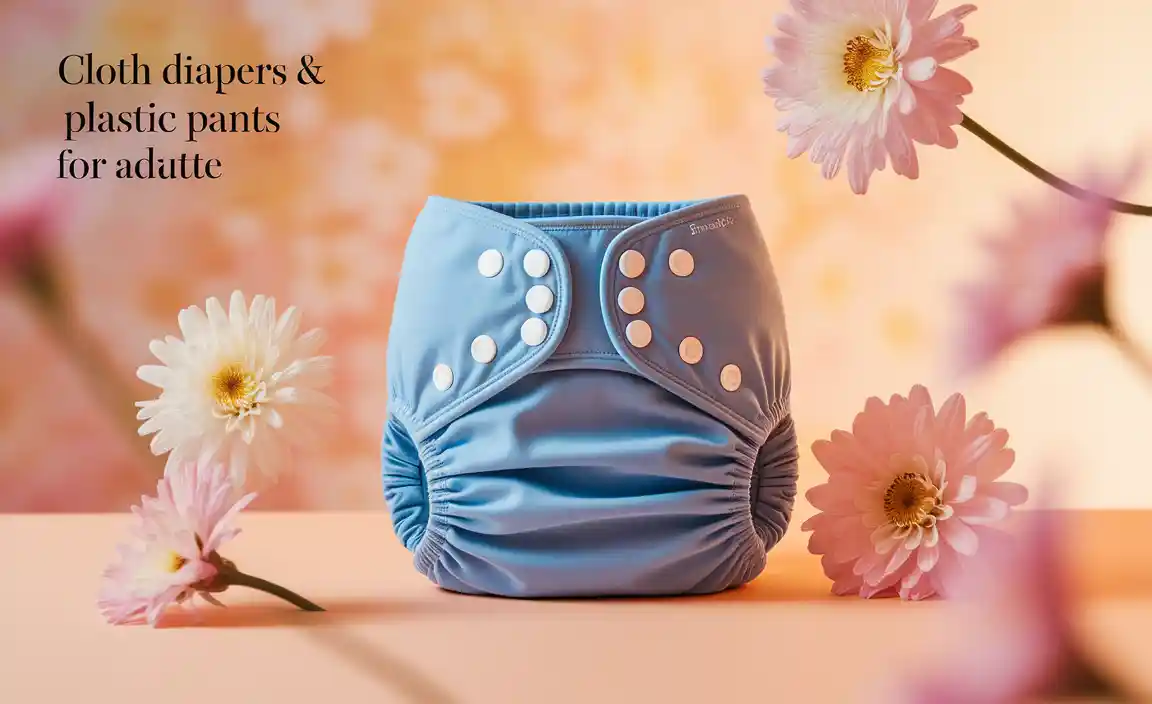Adult incontinence can be an extremely distressing and embarrassing condition that can affect anyone. If you or someone you know is experiencing adult incontinence or diaper use, you might be looking for ways to reduce its impact.
Incontinence can occur to anyone, irrespective of what stage of life you are in. It can be an embarrassing and even isolating experience. While certain factors like aging, pregnancy, and disease can increase the chances of adult incontinence, your diet also plays a significant role.
What you consume can impact your bladder and bowel movements. We will explore the impact of diet on adult incontinence and diaper use. However, we will discuss what you should avoid foods or drinks, what specific foods or nutrients can help prevent adult incontinence, and the role weight loss can play in reducing it.
We will also provide tips on ensuring your diet effectively prevents diaper problems. So, read on to learn about the foods you should be wary of and what you can do to ensure you stay healthy and comfortable.

The Impact Of Diet On Adult Incontinence And Diaper Use
Diet has a significant impact on adult incontinence and can influence the use of diapers. People with medical issues or with obesity are more likely to experience incontinence. Certain foods and drinks can increase the risk of urinary tract infections, resulting in bladder dysfunction. Constipation, which can lead to incontinence, is also caused by poor diet.
Consuming a balanced and healthy diet can help improve overall bladder health and minimize the need for incontinence products. There are numerous ways to introduce dietary changes into your daily life that can aid in improving incontinence and diaper use. A professional dietitian may advise you on a tailored diet plan that best fits your requirements.
What Should You Avoid Foods Or Drinks To Reduce The Risk Of Adult Incontinence?
Changing the diet to a healthy one is undoubtedly an excellent way to reduce the risk of adult incontinence. You should avoid several foods and drinks at all costs. For instance, high-sugar and fatty foods and drinks result in weight gain, which may cause urinary incontinence. Caffeine and alcohol are diuretics that can cause bladder irritation and urinary incontinence.
Therefore, consuming balanced diets and limiting processed foods can play a vital role in reducing adult incontinence. Increasing fiber-rich foods and drinks in your diet helps prevent constipation, which, if left unmanaged, can weaken the bladder muscles. Therefore, it’s essential to avoid those foods and drinks that can negatively affect urinary continence and focus on a healthy diet to minimize the risk of adult incontinence.
Can Changing My Diet Help With Adult Incontinence And Decrease The Need For Diaper Use?
Diet plays a significant role in the development and severity of adult incontinence. Making changes in diet can help alleviate some of the symptoms and even decrease the need for diaper use. Although no perfect diet plan for addressing adult incontinence exists, experimenting with different dietary changes can work wonders.
Consult with a qualified healthcare provider to assess which changes to your diet may be beneficial to you. Be patient and keep trying different dietary modifications until you achieve desired results. Remember, making lasting changes requires effort and determination, so keep at it.
What Are Some Specific Foods Or Nutrients That Can Help Prevent Adult Incontinence?
One of the most common complaints among adults is incontinence. Although many factors can contribute to this problem, such as age, physical conditions, medications, and more, diet is one of the most common causes. Our diet greatly impacts our health and well-being, so paying attention to what we eat is important. Poor nutrition can lead to various issues, including chronic diseases, poor mental health, and even adult incontinence.
Specific foods or nutrients help prevent incontinence. Fruits and vegetables contain vital nutrients such as potassium, essential for maintaining proper muscle and nerve function. Fiber helps regulate bowel movements and prevents constipation. Some specific foods or nutrients that can help include blueberries, celery, eggplant, guava, kidney beans, lentils, oat bran, pumpkin seeds, romaine lettuce, salmon, spinach, and strawberries (frozen or fresh).
Eating these foods regularly can help prevent incontinence. Other than diet changes alone, though (which take time), certain medications like dapoxetine (Sustiva) have also been approved by the FDA for treating mild to moderate forms of stress urinary incontinence in women older than 18 years with a body mass index (BMI) between 25 and 35 kg/m2 who do not wish to undergo surgical treatment.
Can Weight Loss Have An Impact On Adult Incontinence?
There is some evidence suggesting that a weight loss diet may have a positive impact on adult incontinence. Losing weight can decrease the amount of pressure on the bladder and pelvic muscles. However, more research is needed to establish a strong link between the two.
Therefore, anyone suffering from adult incontinence should consult a healthcare professional before making any dietary changes. Also, foods and drinks that increase bladder stimulation can worsen incontinence, so it is important to be mindful of what you consume while trying to lose weight. Keep in mind that losing weight is a long haul, so it is vital to have patience while pursuing it.
What Vitamins Or Supplements Can Help Support Bladder Health?
Maintaining a healthy diet can have a significant impact on adult incontinence and the use of diapers. Consuming vitamins and supplements to maintain proper bladder health is essential. Vitamin B12 is important for bladder function, for the healthy function of the bladder, and to maintain nerve health. Vitamin D is important in absorbing calcium and magnesium, which are essential for healthy bladder function.
Omegas-3 fatty acids keep the bladder walls strong and elastic. Calcium supports the contraction and relaxation of muscles in the bladder and the production of urine. Magnesium helps keep blood pressure balanced and supports a healthy nervous system. A balanced diet with proper vitamin and supplement intake and a healthy lifestyle can help reduce the severity of adult incontinence and minimize the use of diapers, improving one’s overall quality of life.
What Are Some Foods That Can Trigger Or Worsen Adult Incontinence?
Certain types of foods can trigger or worsen adult incontinence. Food that is high in sugar, starch, carbohydrates, and refined sugars could cause bladder leakage. Salt irritates the urinary tract, leading to frequent urination. As far as dairy products are concerned, these can increase the risk of urinary tract infections.
Alcohol consumption can lead to dehydration, often considered the primary cause of incontinence. Dehydration and reduced bladder control worsen incontinence. One should consult a health professional about developing an appropriate eating plan, which can help combat incontinence. Staying hydrated by drinking plenty of water and other fluids and avoiding consuming foods and drinks that trigger bladder control issues would be best.
How To Make Sure Your Diet Is Effective For Preventing Diaper Problems?
Adult incontinence and diaper use can be distressing, and it’s essential to take preventative measures to reduce these problems. A balanced diet with plenty of fruits and vegetables is one of the most effective preventative measures. To prevent diaper problems, avoiding sugary drinks, high-fat foods, and processed foods is essential, and instead, focus on consuming healthy, nutrient-dense items.
Incorporating physical activities into your routine, such as walking, helps keep your body healthy while reducing the risk of urinary incontinence. Avoiding caffeine and alcohol can also help since both irritate the bladder and contribute to incontinence. Lastly, getting ample sleep every night is vital to reducing the risk of adult incontinence and preserving the body’s overall health.
Conclusion
It’s crucial to understand the impact of diet on adult incontinence and diaper use. By making simple dietary changes, you can help reduce the risk of adult incontinence and decrease the need for diaper use. Avoiding certain foods and drinks, incorporating bladder-friendly foods and nutrients, and maintaining a healthy weight is essential for improved bladder health. What you eat and drink can significantly impact your bladder and bowel health.
Maintaining a healthy diet and staying hydrated can help prevent adult incontinence and reduce the need for diaper use. Certain foods and drinks like alcohol, caffeine, spicy foods, and artificial sweeteners can irritate the bladder and trigger adult incontinence.
Additionally, taking bladder-supporting supplements can also aid in maintaining bladder function. Remember to pay attention to your body’s reactions to certain foods and be mindful of your diet to prevent any worsening of symptoms.
Frequently Asked Questions:
[rank_math_rich_snippet id=”s-1af35e6f-5e10-41ca-909c-00cc5778368b”]






